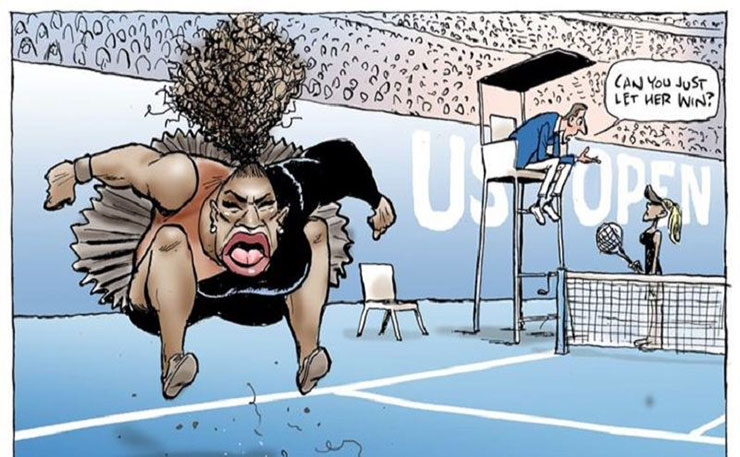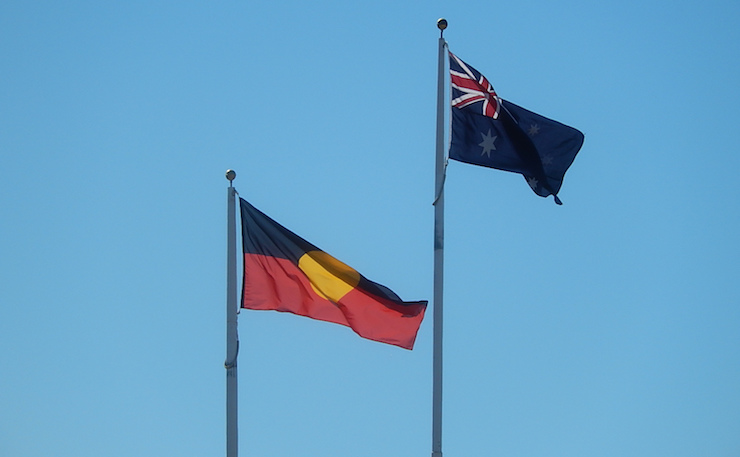There is a way forward to confront the legacy of a colonising nation. Burying our heads in the sand isn’t it, writes Caitlin Prince.
Last week, a nine-year-old refused to stand for the national anthem to protest its lack of recognition of First Nations, and the country erupted in anger. High profile, fully grown adults publicly called her a brat and threatened to “kick her up the backside”.
In the same week, Mark Knight’s cartoon of Serena Williams was criticised internationally as racist, and Australian media doubled down to defend it. “Welcome to PC world” the Herald Sun published on its front page, while Knight accused the world of “going crazy” and suspended his Twitter account.
Meanwhile, two Aboriginal teenagers died in Perth running away from police, and communities pushed again for government action on the high rates of Aboriginal deaths in custody. Yeah — how dare people suggest Australia is racist!
I can’t imagine how it felt to be Aboriginal during this (not atypical) week. Although I don’t have to imagine — Celeste Liddle (@Utopiana), the Aboriginal writer and activist, tweeted:
We’re constantly stuck trying to remind white people of the humanity of Aboriginal people – particularly Aboriginal women and children. It’s tiring, devastating and as we continually end up back in the same place, clearly not working. Sort your shit out, Australia.
— Celeste Liddle (@Utopiana) September 17, 2018
Emotions run high when it comes to the topic of racism and First Nations people. The fact that a nine-year-old can elicit such a venomous rebuke from senators and media personalities is testament to that. In my experience though, it isn’t only alt-right conservatives who have strong emotions about this topic. In the past eight years that I’ve worked in remote Aboriginal communities, every non-Aboriginal person I’ve worked with has experienced a strong reaction to the interface of Australia’s race relations.
Defensive anger is a common reaction to having your worldview challenged. Researcher Megan Boler believes it’s an attempt to protect not only one’s beliefs but one’s “precarious sense of identity”; a defence of one’s investment in the values of the dominant culture.
The problem with growing up within the dominant culture is that it’s easy to be oblivious to anything outside of it. As Tim Soutphommasane, the outgoing Race Discrimination Commissioner, recently pointed out in The Griffith Review, Australia’s media and political structures are still dominated by white men of Anglo-Celtic or European background. While in reality, Australia is far more culturally diverse, the positions that shape both the nation’s policies and stories we tell about it, are still dominated by Anglo-Australians.
When voices from outside the dominant culture do reach us, their perspectives are unexpected, drawn from life experience beyond our shared frames of reference. Their criticism can feel like it’s come out of the blue.
Knight said his cartoon wasn’t about race. Perhaps he was naive to the history of caricature that represented black people as infantile sambos. His intention may not have been racist. As white people, we often mistakenly believe that racism requires a conscious belief that black people are less human than us, but mostly racism is unconscious and internalised.

It’s all the more bewildering to be accused of racism when it isn’t your intention, such as a health professional who wants to help, discovering they’ve unknowingly offended their Aboriginal client; or a well-intentioned teacher, who had no idea teaching only in English to a community with a different first language, might cause harm. Or perhaps a cartoonist, who prided himself on insightful social commentary, but had his blind spots pointed out.
Frequently, we react defensively and insist our actions aren’t racist when we’d be better served by realising we didn’t know it was racist and listening to people of colour to understand why, without minimising or denying their concerns.
Anger is not the only emotional response I see in non-Aboriginal people when confronted with our country’s racism. Some people respond with grief and sadness, others with guilt and shame. Nearly always, there are feelings of helplessness that easily flick over into dissociation, numbness and denial. Megan Boler writes that denial “feeds on our lack of awareness of how powerlessness functions, effects, feeds on, and drains our sense of agency and power as active creators of self and world-representations. By powerlessness I mean a state that is usually silent and mutates into guilt and denial that gnaws at us….”
Our country struggles with meaningful recognition of our First Nations, in part due to these feelings of powerlessness and being overwhelmed. We are divided, black from white, by the privilege of being able to drift off into denial. Aboriginal people remain pressed up against the painful consequences of racism with the daily deaths, incarceration, and illness of their family members. Non-Aboriginal Australians on the other hand, bump along, failing to grapple with the overwhelming task of reckoning with our genocidal history and its ongoing legacy.
People of colour refer to “white fragility”, and while I think the term is fair (if the suffering could be weighed, there would be no competition), unless we respond wisely to emotions triggered by discussions of racism, we’re not going to progress the national conversation. Emerging from denial is like thawing from ice; it comes with the pins and needles of moving out of a long-held, contracted position. It’s painful, and people react emotionally.
I’ve worked for eight years now in remote health. I often feel paralysed, at a loss as to how to break through the thick walls of indifference, denial, and defensive anger that characterises so much of our country’s response to our First Nations.
How can I, as one voice, possibly affect it? I want to run away, to not face it. And right there, in the choice to not confront racism, is white privilege.
The moment I choose to do nothing, the moment I stop wrestling with my emotions and slip instead into denial and avoidance, I act out the privilege that has and continues to cause so much harm to our First Nations.
To do nothing is to be complicit.
What a painful thing to have to face.
In the Uluru Statement from the Heart, our First Nations have offered a roadmap for facing this overwhelming task — A First Nations Voice to Parliament, and a Makarrata Commission to oversee an agreement-making and truth-telling process. The way forward may not be easy, but it is clear.
Donate To New Matilda
New Matilda is a small, independent media outlet. We survive through reader contributions, and never losing a lawsuit. If you got something from this article, giving something back helps us to continue speaking truth to power. Every little bit counts.




